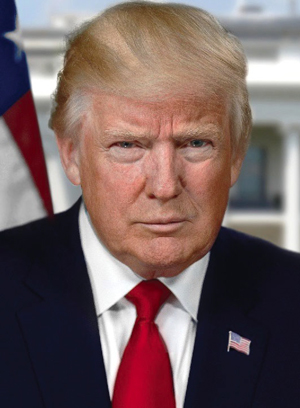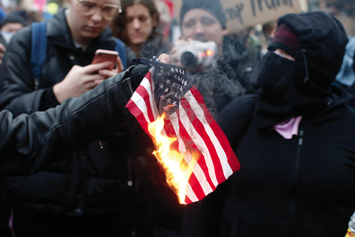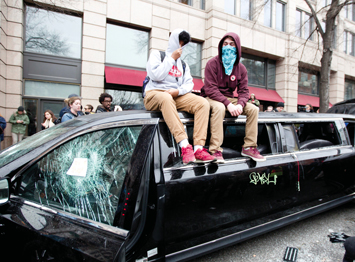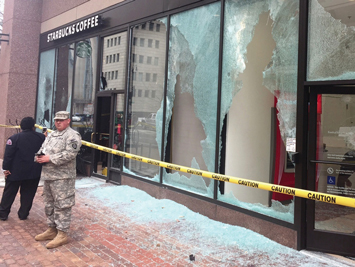Divided Democracy: The Volatile Trump Era Opens With Anger Alongside Insults And Division
By Barrington M. Salmon -Contributing Writer- | Last updated: Jan 24, 2017 - 6:58:23 PM
Demonstrators torch a car during the demonstration in downtown Washington, Jan. 20, during the inauguration of President Donald Trump. (R) Protesters stand on cars during a demonstration after the inauguration of President Donald Trump, Jan. 20, in Washington.
|
WASHINGTON—It wasn’t hard to spot Trump supporters on the morning and afternoon of the presidential inauguration because of their headgear.
Most were easily identifiable by their bright red baseball caps emblazoned with the mantra of the man who defied political convention to become the 45th president of the United States—“Make America Great Again.” Other supporters wore red coats and hats and still others cloaked themselves with large American flags, socks, eyeglasses, shorts, bandanas and other paraphernalia.

President Donald J. Trump
|
Under cloudy, grey and rainy skies, Trump supporters walked around with a certain cockiness and an air of elation. One of those people was Patricia Nana, a West Palm Beach, Fla., resident.
“I was a supporter even before Donald Trump ran for office,” said Ms. Nana, a pharmacist who wore a navy blue woolen Trump snow cap. “I’m a first-generation immigrant, and he’s third-generation. He understands how to fix America. I’m in health care and drug use is out of control. We need law and order. He will put America on the right path. He wants people to have culture, make them work hard.”
Ms. Nana, who hails from West Africa, didn’t see any contradiction with a Black woman supporting a man who insulted, demeaned and belittled Blacks, people of color, immigrants, women and others in a cynical and calculated plan to secure the White vote. She is also one of the few Blacks aligned with the new president.
Mr. Trump tapped into the pain and anxiety of White Americans caused by economic dislocation, the hollowing out of the middle class and a rapidly changing workplace but he also exploited White racial resentment.
He surprised and offended Americans when someone leaked a conversation between himself and former Access Hollywood host Billy Bush. He bragged about being able to grab women’s private parts and getting away with it because he’s a celebrity. Critics excoriated him and there was the thought that he could never win the presidential election but he defied political wisdom and won anyway.
Mr. Trump, a New York-based real estate business mogul, began an improbable campaign for the nation’s highest office more than 18 months ago. Along the way, he managed to alienate large swathes of Blacks, Muslims, Latinos, Millennials, Independents and others. He has faced a firestorm of criticism for his coarseness, his sexist behavior and rhetoric, his unwillingness to denounce the Neo-Nazis, Klan members and organizations who support him and his racial dog whistles.

A crowd gathers to protest and burn fl ags in Pioneer Courthouse Square following Donald Trump's presidential inauguration, Jan. 20, in Portland, Ore. Police in Portland used incendiary devices and tear gas to disperse a crowd of people protesting President Trump. Authorities said some people in the crowd—that at one point numbered in the thousands—threw rocks, bottles, fl ares and "unknown liquid" at offi cers. Photos: AP/Wide World photos
|
Organizers of the protests said more than 45,000 people took part in the inauguration day demonstrations. Hundreds of thousands of demonstrators showed up the next day.
Throughout inauguration day, an air of tension hung in the air, illustrating the friction and hostility that still exists between Trump opponents and those who support him. A number of people who voted for Trump expressed annoyance and frustration with the fact that Trump opponents won’t just accept that their guy won.
Security was extremely tight as befitted the occasion, with a heavy presence from members of the District of Columbia’s 29 police agencies including the U.S. Secret Service, the Metropolitan Police Department, the Department of Homeland Security, and the National Guard under high alert. Camouflaged Humvees, police cars and other law enforcement vehicles were stationed at strategic street corners and helicopters clattered noisily as they zoomed around overhead.
Throngs of protestors stood on the sidewalk across from the National Archives on 7th and Pennsylvania Avenue chanting their disapproval of Mr. Trump, and by their body language and other methods illustrated their disapproval. The loud, raucous and robust outbursts mixed with sometimes sharp verbal exchanges between demonstrators who clashed with Trump supporters as each tossed invectives and sharp words at each other. These are signs of the partisan rancor that has gripped the country.
Then there was the pepper-spray, the broken windows and the running battles between police and some black-clad demonstrators and some 200 arrests made. The protestors manned some checkpoints leading to the inauguration and vocally expressed their disdain for the incoming president. These run-ins were captured live by the media and beamed around the globe.

Demonstrators sit at the top of a limousine with the windows broken during the demonstration downtown Washington, Jan. 20, during the inauguration of President Donald Trump.
|
“You know what inspires me? It’s seeing all of you out here,” said Nefer Freeman, a host on WPFW, 89.3 FM. “This rightwing, fascist-oriented person has mobilized us. People out here seem to be clear that Trump isn’t fundamentally the problem. The problem isn’t Trump or (Hillary) Clinton, it’s the system.”
“Democrats are talking about a peaceful transition. What we have are two factions within the campaigns of our enemies who disagree with each other. We’ve got to be clear about who and what we face. We had austerity and increased surveillance under Obama. We have to mobilize and we must be organized. We have to build infrastructure as well as instruments of our survival and defense. When the people are under attack, we have to stand up and fight back. Some people thought slavery would never end, but it did. We must resist and fight and build and fight. Through collectives, we are creating the world we want to see.”
Leslie Mittelberg and her daughter-in-law Nuvia Nevarez traveled cross-country from Oregon and Arizona respectively, to stand on the frontlines of protests against President Donald Trump. On a day usually filled with celebration, anticipation and hope for the future, the pair reflected the anxiety, frustration and angst of a segment of the American populace vehemently opposed to Mr. Trump.
“I’m here representing the people who feel unsafe,” said Ms. Nevarez, a teacher, who works with undocumented immigrants in Arizona. “I’m concerned about the defunding of social programs and schools and the even bigger wage and income gap between rich and poor. I’m disappointed that Trump chose Betsy Devos. I see an increase in the attacks on public schools and a focus on school choice and vouchers.”
Mrs. Devos is a Michigan billionaire whose children never attended public schools, who has no professional experience in public schools but is an avid advocate of the privatization of public schools and a vocal supporter of the school voucher system. Critics say she was chosen by Trump because she’s a wealthy political donor. He says he chose her to be a “disruptor.”
Ms. Mittelberg, who carried a poster that stated, “Not a Legitimate President,” shook her head and looked pained when asked if she’s surprised Mr. Trump won the White House.
“I’m stunned that he got in. It wasn’t even on my radar,” said Ms. Mittelberg, who was in Washington to attend the Women’s March scheduled to take place on Jan. 21. “He’s a foul human being. I don’t think he’ll last four years. He’ll be impeached.”

Tape closes off broken windows at businesses in Northwest Washington, Jan. 20, after a confrontation with protestors blocks from Donald Trump's inauguration. Photos: AP/Wide World photos
|
“African countries are scared shitless. They will be a lot of global suffering,” she said.
The rally and women’s march were organized to protest Mr. Trump, repudiate his policies and the direction he intends to take the country. The march proclaimed women’s rights and drew between 500,000 and 750,000 men, women and children to the Nation’s Capital. Millions more demonstrators gathered in 600 cities.
Mr. Trump takes control of the White House at a time when politics have become increasingly polarized.
But historians struggle to cite a precedent for a new president who is both beneficiary and target of such powerful and rising grassroots movements.
“It’s hard for anyone to say when we’re at a pivotal point, but I think these may be seismic shifts,” Timothy Naftali, an historian at New York University and the founding director of the Richard Nixon Presidential Library and Museum, said in an interview with USA Today. “We thought there was an era of new politics because of the role Trump played in the Republican Party, but the new politics may not just be of the right. We may be seeing a new politics in the center and the left.”
Mr. Trump, the thrice married, serial philanderer and accused sexual predator, has promised and is in the midst of shaking up the political landscape. Although he is a few days into his tenure, a chorus of critics contend that the U.S. is on the wrong path.
Trump loyalist Neil Arnott strenuously disagreed.
“I’m a big-time Trump supporter. Although he isn’t really a conservative, I support his values,” said Mr. Arnott, a Vietnam vet who served 25 years in the US Air Force. “I believe in a hands-off government except for the military, the police or services to people such as fire services. As for Obamacare, we should privatize medicine and people can go to Canada if they need medications.”
The Florida resident said he hopes Mr. Trump will secure America’s borders stop immigration from South America and block the entry of Syrians into the country.
“It’s easy to bring back coal miners’ jobs and those in the Rust Belt,” he insisted. He anticipates that Mr. Trump will scuttle what he described as “excessive regulation” and free up businesses.
There is one promise of deregulation that Mr. Arnott said worries him.
“I remember the smog in Beijing and Los Angeles. That makes me a little conflicted about deregulating the EPA,” he said.
Longtime activist Phil Wilayto, publisher of The Virginia Defender and a leader of the United National Antiwar Coalition, said, “We’re not afraid and we’re not intimidated. These protestors are strong, angry and they’re young. What’s missing is, ‘what’s our program?’ We need jobs or guaranteed incomes for all. Healthcare for all and free education. We must appeal to workers who feel left out. Like coal workers and those in the Rust Belt.”
Mr. Wilayto said he strongly advocates no deportations of undocumented immigrants, reparations for Blacks, protection of women’s reproductive rights and transgender and others who are in the LBGTQ communities.
In the Trump era, he said, those opposed to the new president need to build a strong united front, build coalitions, deepen ties of solidarity and do the hard work of bridging the chasms between class and race.
Queens, New York resident Katrina Garcia agreed.
“We have to take matters into our own hands,” said Ms. Garcia, a member of the Party for Socialism and Liberation and community organizer. “We can’t trust politicians. We have already learned the hard way. President Obama’s election was symbolic and he got a pass on issues of justice. He deported more undocumented immigrants than most recent presidents and came in with ‘si se puede.’ ”
“We were not given real options. The Democratic Party doesn’t represent us. I’m not crying over Hillary Clinton. I’m not crying over Trump. We need economic, political and social rights. The majority of the people don’t support Trump. Millions of Americans are not able to vote and their rights—for felons and the undocumented—have been taken away. People thought we’d get real change but we’re dealing with the consequences of our political system and the betrayal of the Democratic Party.”